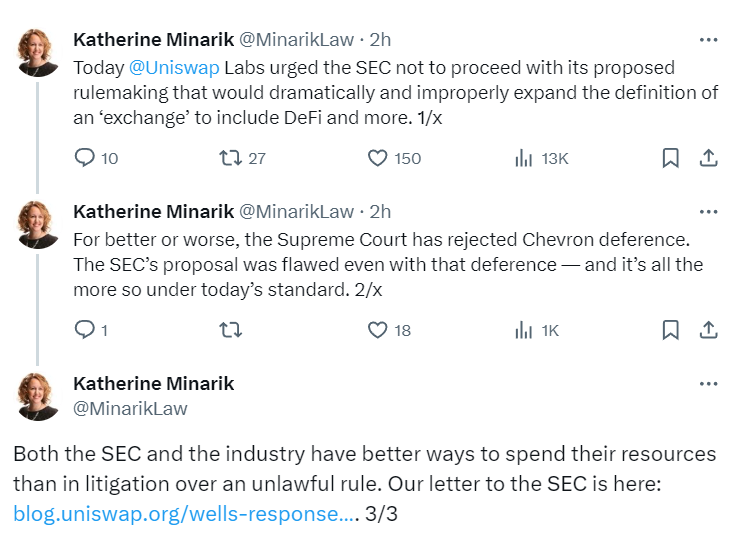Uniswap Labs has essentially told the U.S. Securities and Exchange Commission (SEC) to take its DeFi regulation proposal and toss it in the trash. The decentralized exchange (DEX) developer is flexing its legal muscles, citing a recent Supreme Court decision—the Chevron doctrine to be precise (more on this in a sec).
Related: Uniswap Foundation Bears it All Ahead of Fee Mechanism Vote
Today @Uniswap Labs urged the SEC not to proceed with its proposed rulemaking that would dramatically and improperly expand the definition of an ‘exchange’ to include DeFi and more. 1/x
— Katherine Minarik (@MinarikLaw) July 9, 2024
Here's the lowdown on this high-stakes:
- Uniswap Labs sent a letter to the SEC on Tuesday, July 9, urging them to drop their DeFi regulation proposal
- They cited the recent Supreme Court decision overturning the Chevron doctrine as a key argument
- The SEC proposed expanding the definition of an "exchange" in April 2023 to include DeFi protocols
- Uniswap argues that the SEC's proposal exceeds its statutory authority and is unlikely to survive a court challenge
Now, let's dive deeper into this crypto-legal rabbit hole, shall we?
Uniswap, the poster child of decentralized exchanges, isn't just sitting back and watching the regulatory tides rise. They're actively pushing back against the SEC's attempts to bring the DeFi world under its umbrella. In a recent letter, Uniswap essentially told the SEC, "Thanks, but no thanks" to their proposed DeFi regulations.
The Crux of Uniswap's Argument?
The recent Supreme Court decision that overturned the Chevron doctrine. For those who aren't legal eagles, the Chevron doctrine was like a "Get Out of Jail Free" card for federal agencies, giving them the benefit of the doubt when interpreting vague laws.
But now that the Supreme Court has pulled that rug out from under the SEC's feet, Uniswap sees an opportunity to challenge the regulator's authority.
In their letter, Uniswap didn't mince words. They called the SEC's interpretation of the Exchange Act "aggressive and atextual." That's lawyer-speak for "You're really stretching it, guys." They even went so far as to say that the SEC's proposal has "no discernible limits."
But let's rewind a bit. What exactly is the SEC trying to do? Back in April 2023, the securities watchdog proposed expanding the definition of an "exchange" to potentially include DeFi protocols. It was like trying to fit a square peg (DeFi) into a round hole (traditional finance regulations). The SEC's chair, Gary Gensler, even claimed that many crypto trading platforms already fall under the current definition of an exchange and should comply with securities laws.
Related: Ethereum Wants to Beat Bitcoin, Thanks to the SEC - K33 Research
Uniswap, however, isn't buying it.
They argue that the SEC's proposal relies on a "staggeringly broad and unprecedented" reading of the Securities Exchange Act of 1934.
But here's where it gets really interesting. Uniswap isn't just saying the SEC is wrong – they're saying the regulator is wasting its time and resources. In their letter, they argued that pursuing these amendments would be a waste of the SEC's "limited resources."
The implications of this standoff are huge. If Uniswap's challenge is successful, it could put a significant dent in the SEC's ability to regulate the DeFi space. It's not just about one exchange – it's about the future of decentralized finance as a whole. We're talking potential registration requirements, compliance costs, and enough red tape to gift wrap the blockchain.

And let's not forget, this isn't Uniswap's first rodeo with the SEC. Back in April, they received a Wells notice from the regulator—essentially a "we're thinking about suing you" letter. Uniswap's response?
They called it an "abuse of power" and said they're ready to "fight" in court if necessary.
So, what happens now? Well, that's the million-Bitcoin question. The SEC could double down on its proposal, risking a legal battle. Or they could back off, potentially leaving the DeFi space in its current, largely unregulated state.
Disclaimer: All materials on this site are for informational purposes only. None of the material should be interpreted as investment advice. Please note that despite the nature of much of the material created and hosted on this website, HODL FM is not a financial reference resource and the opinions of authors and other contributors are their own and should not be taken as financial advice. If you require advice of this sort, HODL FM strongly recommends contacting a qualified industry professional.




